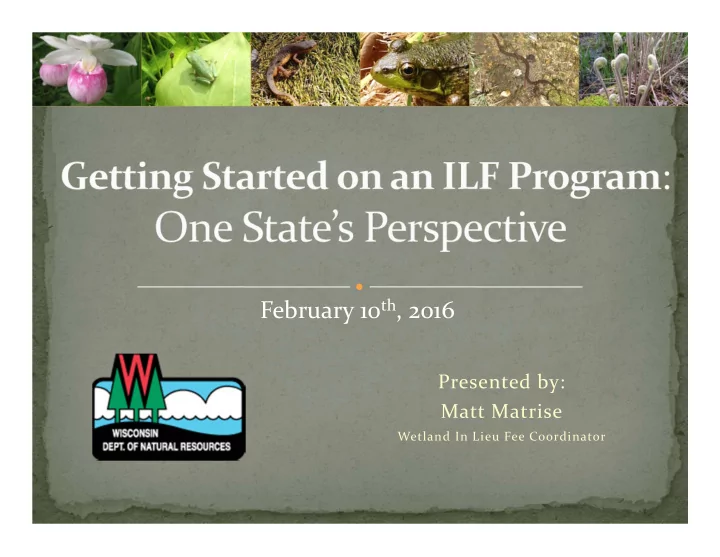

February 10 th , 2016 Presented by: Matt Matrise Wetland In Lieu Fee Coordinator
The Process Required Resources Key Program Elements Credit Fee Advanced Credits Released Credit Schedule Compensation Planning Framework Staffing Considerations Program Demand Mitigation Process Current & Future Challenges Helpful Resources
New Wetland Regulations effective July 2012 “…the Department may establish an in lieu fee subprogram,…” State Wetland Permits Required Mitigation for first time Mitigation Banking since 2002 not enough credits to new mitigation demand, backlog Provide full suite of Mitigation Options Banking, In Lieu Fee, Permittee Responsible Our Program Objectives Focus on the greatest watershed needs Complete projects on the ground selected through a watershed approach
Setting Realistic Expectations Total Federal Review 225 days / 7.5 months / 0.61 years Doesn’t include Sponsor response Our WI Program Approval 614 days / 20 months / 1.68 years Why the extra year? Credit Fee Advanced Credits Compensation Planning Framework GIS support
Dedicated Staff & Funding Program Scope / Service Areas (HUC) GIS support Baseline Data Permit / mitigation demand Advanced Credits Credit Fee True cost accounting
True Cost Accounting Inaugural Fee vs. Annual Adjustments Financial Assurances for Banks & Permittee Responsible Ballpark check – National ILF scene Annual Adjustments Not a modification to Instrument Land Price Adjustment Fee Components Administrative + Contingency + Construction & Monitoring + Long Term Management
33 CFR 332.8(n) Compensation Planning Framework, Sponsor’s project reputation, required project financing. Our WI Program: Tangible equation annual avg impact acres * Mitigation Ratio *3 years to fulfill Intangible adjustments Service Area size & urbanization, Banking presence, current permit activity, anticipated activity (i.e. mining). Hindsight New regulatory climate, untested demands Large utility projects, rail for non ‐ metallic mining
Driving force behind your watershed approach. Finding balance on the watershed spectrum? Watershed analysis: Non- Watershed plans: Prescribed Watershed-informed decision prescribed outcomes outcomes framework Decision ‐ tree or questions to guide Identifies watershed need(s). Identifies watershed need(s). consideration of watershed factors. Includes the consideration of watershed No or little translation of watershed Describes specific, measureable desired needs(s). need(s) into specific desired watershed watershed outcome(s). outcome(s). Potential of site to develop and persist is Includes analysis of the potential of sites Includes analysis of the potential of sites determined through individual site to develop and persist in a particular to develop and persist in a particular assessments. location. location. No assessment of the potential of sites Assesses the potential of sites to meet Assesses the potential of sites to meet to meet watershed need(s). watershed needs. watershed needs. No comparison of the relative ability of Compares sites to evaluate their relative Compares sites to evaluate their relative sites to sustain desired characteristics ability to sustain desired characteristics ability to sustain desired characteristics and to address watershed needs. and to address watershed needs. and to address watershed needs. Watershed Approach Handbook (ELI & TNC September 2014)
Sponsor & Administrative Responsibilities We serve both roles Capture appropriate Administrative fee (5% ‐ 20%) How will you find projects? We have two options Open Solicitation Grant Program Closed Internal project development What expertise do you have vs. want? Started with a single Coordinator Hiring a Wetland Ecologist Identify major tasks Administrative & Reporting / Credit Sales / Project Oversight
Does not change the requirement to: First Avoid, then Minimize and lastly mitigate . Follow general hierarchy in the 2008 Federal Rule 1. Mitigation Banking Preferred over ILF for – no temporal loss. 2. In ‐ Lieu Fee Program Preferred over PRM for – watershed selection, extensive planning, larger impact. 3. Permittee ‐ Responsible Mitigation How will your program interact with Banking?
Current Creating a new program & related process Staying one step ahead of a puzzle of requirements Dwindling Advanced Credits vs. fulfillment Schedule Staffing up to meet task demands Future Credit Fulfillment vs. approval ladder Revisions to Instrument capturing best available data Sustainability vs. growth (finding your niche)
ELI Webinar Series on ILF Mitigation: http://www.eli.org/events/2013 ‐ in ‐ lieu ‐ fee ‐ mitigation ‐ training ‐ webinar ‐ series http://www.eli.org/events/2015 ‐ 16 ‐ in ‐ lieu ‐ fee ‐ mitigation ‐ training ‐ webinar ‐ series ELI Model Language: http://www.eli.org/research ‐ report/lieu ‐ fee ‐ mitigation ‐ model ‐ instrument ‐ language ‐ and ‐ resources Regulatory In ‐ Lieu Fee & Banking Info Tracking System https://ribits.usace.army.mil/ribits_apex/f?p=107:2 ELI/TNC Watershed Approach Handbook http://www.eli.org/research ‐ report/watershed ‐ approach ‐ handbook Watershed Approach to Wetland Functional Assessment Collaborative project between WI DNR & WI TNC, funded by EPA Wetland Dev. Grant National In Lieu Fee Mitigation Workshop: July 13 ‐ 14, 2016 http://www.eli.org/events/lieu ‐ fee ‐ mitigation ‐ workshop
Matt Matrise Wetland In ‐ Lieu Fee Coordinator W ISCONSIN D EPARTMENT OF N ATURAL R ESOURCES (262) 574 ‐ 2124 Matthew.Matrise@wi.gov http://dnr.wi.gov/topic/Wetlands/mitigation/WWCT.html
Recommend
More recommend